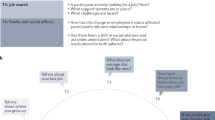Abstract
The rationale of research interviews is to gain people’s knowledge, views, and experiences, which are meaningful in understanding social realities. Although some research interviews are time-consuming, researchers can interact and communicate while developing a rapport with people to find out these facts—something observations or surveys can never do. How a response from an interview is made (tone of voice, facial expression, hesitation) can feed information that a written response would conceal. Having a good audio quality recorder would be of great assistance. However, if the respondent refuses to be recorded, researchers should practise note-taking. Researchers need to be careful of what and how to ask, as some information may be controversial and confidential. Interviews are a highly subjective method, and the danger of bias always exists.
Access this chapter
Tax calculation will be finalised at checkout
Purchases are for personal use only
Similar content being viewed by others
References
Abramson, J. S. & Mizrahi, T. (1994). Examining social work/physician collaboration: An application of grounded theory methods. Qualitative Studies in Social Work Research, 28–48.
Ahmed, V., Opolu, A., & Aziz, Z. (Eds.). (2016). Research methodology in the built environment: A selection of case studies. Taylor & Francis.
Buckeldee, J. (1994). Interviewing carers in their own homes. In The research experience in nursing (pp. 101–114). Chapman and Hall.
Hussein, H. (2009). Therapeutic intervention: Using the sensory garden to enhance the quality of life for children with special needs. Unpublished doctoral.
Hussein, H. (2012a). Affordances of sensory garden towards learning and self-development of special schooled children. International Journal of Psychological Studies, 4(1), 135–149.
Hussein, H. (2012b). The influence of sensory gardens on the behaviour of children with special educational needs. Procedia—Social and Behavioural Sciences, 38, 343–354.
Hussein, H., & Daud, M. N. (2015). Examining the methods for investigating behavioural clues of special-schooled children. Field Methods, 27(1), 97–112.
Islam, M. R. & Faruque, C. J. (Eds.). (2016). Qualitative research: Tools and techniques (eds.). CreateSpace Independent Publishing Platform.
Mason, J. (1996). Qualitative researching. Saga.
Zeisel, J. (1981). Inquiry by design: Tools for environment-behaviour research. University Press.
Zimring, C. M. (1987). Evaluation of designed environments: Methods for post-occupancy evaluation. In Bechtel, Marans & Mitchelson (Eds.), Methods in environmental and behavioural research. Van Nostrand.
Author information
Authors and Affiliations
Corresponding author
Editor information
Editors and Affiliations
Rights and permissions
Copyright information
© 2022 The Author(s), under exclusive license to Springer Nature Singapore Pte Ltd.
About this chapter
Cite this chapter
Hussein, H. (2022). Interview Method. In: Islam, M.R., Khan, N.A., Baikady, R. (eds) Principles of Social Research Methodology. Springer, Singapore. https://doi.org/10.1007/978-981-19-5441-2_14
Download citation
DOI: https://doi.org/10.1007/978-981-19-5441-2_14
Published:
Publisher Name: Springer, Singapore
Print ISBN: 978-981-19-5219-7
Online ISBN: 978-981-19-5441-2
eBook Packages: Social Sciences




